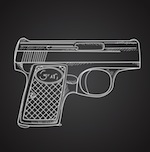By David Wolf, Attorney
Published by Child Injury Lawyer Network

In the United States, we have a constitutional right to bear arms. A right that is very important to gun owners and people who feel strongly about the Second Amendment. Even though there is a right to gun ownership, it does not mean that the handling, storage, operation, and maintenance of a gun is without responsibility. A gun owner should take reasonable efforts to secure and safeguard guns in his possession. This is especially important in homes, day care centers, and other areas where children live or children visit. It is important for a gun owner to be trained and obtained knowledge as to the proper maintenance in to avoid any malfunctions during use and even to avoid any malfunctions or accidental shootings during the cleaning and maintenance of the gun. Unfortunately, children are injured and even die every year due to an accidental shooting and/or the negligent maintenance, ownership, or storage of a gun. When there is a shooting, there can be a criminal case prosecution if local law enforcement and the state or district attorney determine that the acts were criminal in nature under the applicable laws, statutes, or ordinances. An incident is certainly committed and can be prosecuted if it was committed with intent. An incident can also be deemed criminal in nature if the condut of the shooter and / or the gun owner was reckless in nature. Separate and apart from the potential criminal case, there may be a civil case to pursue against the gun owner, shooter, and / or property owner where the incident took place. A civil case, unlike a criminal case, seeks compensation for not only medical bills but also for pain, suffering, and loss of enjoyment of life. Typically, there are four elements to a civil cause of action involving allegations of negligence or carelessness as follows:
1 Duty;
2. Breach of Duty;
3. Causation; and
4. Damages.
Let’s look at a potential civil case. A day care center owner has a permit for a handgun. The gun is not locked away but kept in a drawer with crayons, markers, and other supplies. During the day, a 5 year old reached into the drawer and accidentally shot another student. The other student suffered serious personal injuries. A civil case may be established by the following:
1. Duty. The day care center owner (gun owner) had a duty to keep the gun out of the reach of children. There may also be a State or local law that requires a gun in such a setting or a home to be secured in a lock box or other location.
2. Breach of Duty. The day care center owner (gun owner) breached the duty by placing the gun in an unsecured area where it was within reach of a child.
3. Causation. The failure to exercise reasonable care on the part of the gun owner (day care center operator) led or caused the damages or the injuries.
4. Damages. The victim, who was a student at the day care center, suffered gunshot related injuries and would be entitled to compensation for pain, suffering, and loss of enjoyment of life.
This is just one of many examples of an incident that could take place. When a child is injured by an accidental shooting or other types of negligence like an automobile accident, bicycle accident, dog bite, etc. . ., the parent should seek out the advice of a Child Injury Lawyer. A Child Injury Lawyer can evaluate the facts and circumstances and assess whether there is a cause of action to pursue and whether there is liability, homeowner’s insurance, or other types of liability insurance to cover the damages related to the medical bills and personal injuries.
The book titled – The ABCs of Child Injury – Legal Rights of the Injured Child – What Every Parent Should Know – has chapters on Homeowner’s Insurance, Shopping Center & Mall Injuries, Medical Bills & Insurance, Attraction and Theme Park Injuries, and other topics. You can get this book for free at The ABCs of Child Injury.
 Child Injury Lawyer Blog
Child Injury Lawyer Blog

